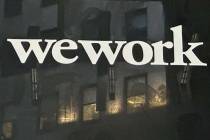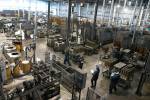State loses 10,700 jobs to China
As August's Summer Olympics open in Beijing, America's top athletes aren't the only homegrown product headed to China. A new study found that some of America's -- and Nevada's -- best jobs have decamped to the People's Republic as well.
The Silver State lost 10,700 jobs to China from 2001 to 2007, according to an analysis from the Economic Policy Institute in Washington, D.C. The losses, which account for actual jobs shed as well as positions that went unformed, include more than 1,650 posts in food services and hotels. Also gone: blue-collar manufacturing jobs; manufacturing support services such as transportation; science and engineering jobs related to manufacturing; and advanced technology jobs, said Scott Paul, executive director of the Alliance for American Manufacturing, which commissioned the study.
The nation lost 2.3 million jobs to China in the same period, the report said.
Local economists respond that the number of Nevada jobs shipped to China pales in comparison to overall job formation here. Nevada businesses added 240,500 positions from 2001 to 2007, according to numbers from the state's Department of Employment, Training and Rehabilitation. That includes 34,400 jobs in hotels and 6,900 positions in manufacturing. Nevada has clocked in as the only state with any recent manufacturing growth, said Ray Bacon, executive director of the Nevada Manufacturers Association.
Bacon said he couldn't think offhand of Nevada manufacturers that sent jobs directly to China. He cited a maker of foams for flower bouquets that shuttered its Dayton operation about seven years ago and moved to South Korea, where its market was expanding. He also pointed to a Sparks manufacturer of ear-protection muffs that consolidated operations in its Michigan plant after less-expensive Chinese earmuffs took over the U.S. marketplace. Both companies had 20 or 30 workers, Bacon said, and they paid anywhere from $12 to more than $15 an hour at the time they closed.
"Our losses have been relatively minor, and most of the time they've been situations where the jobs in Nevada wouldn't have moved except for the fact that the main product they were supplying moved," Bacon said. "Instead of the jobs directly moving to China, the marketplace moved to China."
As for the 1,650 jobs the EPI said Nevada dropped in food service and hotels, state economist Bill Anderson said a variety of factors make it difficult to pinpoint whether direct competition from China forced the losses. Some big casinos, such as the 1,800-employee Stardust, have closed in recent years, but they're making way for even bigger developments. The 10,000- employee Echelon is scheduled to replace the Stardust in 2010.
"It's not like a hotel will close and shift its operations from the Las Vegas Strip to China," said Anderson, chief economist at the employment department.
But job numbers are only part of the problem, Paul said.
Nationally, among workers whose jobs went to China, 31 percent had four-year college degrees, and more than 50 percent landed in the upper half of the country's wage structure, he said. Their replacement jobs pay, on average, $8,146 less annually. That cost the American economy $19.4 billion in 2007. Lower salaries also suppress pay gains across the board, and they mean lower tax revenue for state and local governments, Paul added.
Bacon agreed that the report's findings reflect turbulence in American industry.
He estimated that as many as 80 percent of his group's members aren't hiring right now. And any study that points to weakness in U.S. manufacturing should raise alarms.
"The sectors of the U.S. economy that truly add value are the sectors that produce something, whether it's goods, minerals that come out of the earth or food products," Bacon said. "Those sectors are mining, agriculture and manufacturing. When those sectors are weak, we're in trouble, and those sectors are all weak."
Trade with China has its positive side, Bacon said.
Nevada manufacturers that buy cheaper goods and commodities from China can reduce their costs and retain more workers, he said.
What's more, Silver State companies enjoyed jumps in business from contracts overseas. Statistics from the Nevada Commission on Economic Development show a 10 percent increase in Nevada exports in the most recent quarter when compared with a year earlier. Shipments of industrial equipment rose 70 percent. Nevada companies including diving-board makers, language phrase-book publishers and landscape architects landed contracts related to the 2008 Summer Olympics that begin in Beijing on Aug. 8.
Nevada got off easy in the EPI's analysis when compared with most other states. Two-thirds of jobs lost nationwide were in manufacturing, Paul said, and the Silver State's relatively small manufacturing base -- industry is just 4 percent of the state's economy -- protected it from the bigger drops that visited factory-heavy states.
Nevada lost about 1 percent of the state's 2001 job base. Idaho topped the list of states in share of jobs that went to China, with 2.59 percent, or 14,700 positions, gone overseas. California ranked No. 5, with 2.23 percent, or 325,800 jobs, shipped to China. Hawaii sent the lowest percentage of its jobs to China, losing 0.74 percent, or 4,100 positions.
"In a sense, we're somewhat sheltered relative to the impacts of job outsourcing," Anderson said. "Our manufacturing sector has held up relatively well."
It would hold up better if U.S. policymakers encouraged China to uphold the agreements it struck when it joined the World Trade Organization in 2001, Paul said. That means urging the Chinese to eliminate subsidies for the country's manufacturers, asking them to stop fixing the value of their currencies and demanding that they enforce laws protecting intellectual property.
"We really need a little more pressure on China to make sure it's honoring the commitments it made to gain greater access to our market," Paul said.
Economic pressures could also restore American jobs transferred overseas.
High fuel prices have made it uneconomical to continue sending some manufacturing work to China, Bacon said. Printing jobs and furniture-making in particular are poised to return stateside, he said. Plus, wages in China annually jump anywhere from 15 percent for assembly-line workers to 200 percent for managers, and those increases could make China less of a bargain in the long run, Bacon said.
"We will be competitive again with the Chinese in 20 years," Bacon said. "It's just going to be hell for that 20 years."
Contact reporter Jennifer Robison at jrobison@reviewjournal.com or 702-380-4512.























